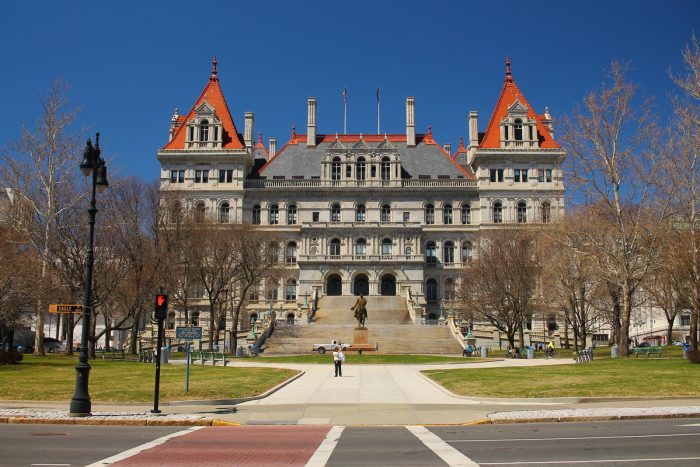Some Long Island state legislators voice opposition to LLC disclosure bill
Limited liability companies, or LLCs, in New York state are staring down new public disclosure requirements.
The proposed LLC Transparency Act “aims to modernize disclosure laws for” LLCs. Along with public disclosure of beneficial owners, the bill would create a public database that includes the names of beneficial owners of NYS LLCs.
Under the “justification” section, the bill states, “anonymous corporate ownership has proliferated since the 1990s,” presenting “numerous problems.” Among these, the legislation cites tax evasion, money laundering, organized crime and drug trafficking, among other social ills, as byproducts of the existing voluntary disclosure scheme.
The bill passed in the state Assembly and Senate earlier this year, and is awaiting Gov. Kathy Hochul’s (D) signature. It would take effect one year after the governor signs it.
Several members of the Long Island delegation, including state Assemblyman Ed Flood (R-Port Jefferson) and Assemblywoman Jodi Giglio (R-Riverhead), voted down the measure.
In separate interviews with the two state legislators, they outlined their opposition.
Privacy
Giglio stated that her objections to the bill were grounded in privacy concerns for the LLC proprietors.
“As an owner of an LLC, I don’t think that your home address should be public, that your private information should be public,” she said.
Addressing the concerns outlined within the legislation, Giglio added that the state government maintains records on the personal information of LLC owners.
She suggested that LLC violations could be monitored and handled by the NYS Department of State instead of the public.
“The state should be doing that digging and not necessarily individual people who can find out somebody’s home address and camp out outside because they don’t like something,” the assemblywoman said.
Redundancy
Flood suggested the LLC Transparency Act was redundant, given that the federal Corporate Transparency Act — which includes similar provisions as the state statute — is set to take effect on Jan. 1, 2024.
“As a small business owner, I know it’s just more paperwork to do,” he said. “It just seemed unnecessary. I understand the purpose of it, but it’s duplicative of what they already do on a federal level.”
Enforcement
The LLC Transparency Act carries a $250 fine for those who fail to register with NYS Department of State. Flood suggested that this penalty isn’t nearly enough to incentivize LLC owners who wish to remain anonymous to disclose their ownership status.
“The bill itself doesn’t have any teeth to it,” Flood said, noting it would likely lead to a collection of fines from responsible business owners rather than rooting out irresponsible LLCs.
“It’s not going to do anything for its proposed purpose,” he added.
On top of the relatively painless fine for violators, Flood noted that the filing deadline is two years and 60 days after the bill takes effect.
“You get two years and two months before the state even steps in to do anything,” he said, adding, “It looks like this bill was done as a feel-good legislation that actually has no effect, which is not uncommon for what we do in Albany.”
Rather than placing public disclosure requirements upon existing LLC proprietors, Giglio recommended that the state conducts more thorough investigations of newly formed LLCs.
“Before the LLC is formed, the initial investigation should occur,” she advised. “And if someone has a history of illicit activities, then the LLC shouldn’t be allowed to be formed.”
Giglio contended that recent state laws have created an increasingly hostile regulatory environment for small businesses. She rooted her opposition to the proposed LLC legislation as countering these trends.
“It seems like it’s getting harder and harder to do business in New York state,” she said. “Any complaint can be investigated, and it’s New York State’s job to make sure that businesses, corporations and LLCs are keeping up to their promises.”







